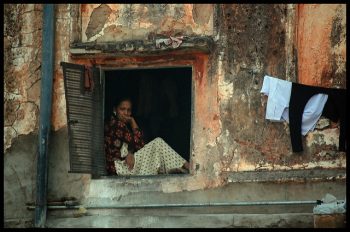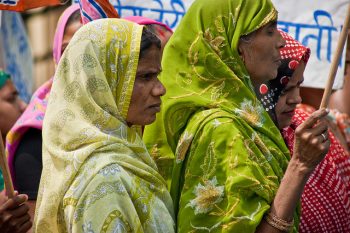In Honor of Women (Naariyon ke Samman Me) Posted by Rachael on Jan 24, 2017 in Hindi Language, Uncategorized
Hello everyone/नमस्ते सब लोग (Namaste sab log)! My apologies (मुझे माफ़ कर दीजिए/Mujhe maaf kar dijiye, please forgive me) for not posting the previous week (पिछले हफ़्ते/pichle hafte)––I became very busy (व्यस्त/vyast) with other work, but now I’m back to talk about a very topical issue (मुद्दा/muddaa, masc. noun)!
This past weekend, I participated in one of the over 600 Women’s Marches (जुलूस/juloos, masc. noun) that took place in the United States and abroad a day after the U.S. presidential inauguration. Not only women but the men in their lives who support them, as well as a plethora of other marginalized peoples, marched to defend a wide array of human rights (मानवाधिकार, masc. noun). Although activism, such as participating in protests, is an important form of resistance to laws and ideologies that one opposes, there are other ways to express your voice that are equally valid. Thinking about the issues (whether that means women’s rights or any other urgent concerns) that particularly trouble you is the first (and integral) step in processing what is going on in the world and your reactions to it. Writing (लिखना/likhnaa) and speaking (बात करना/baat karnaa) to friends, family, colleagues and others with whom you feel comfortable is another excellent way to share your opinions and develop your thought processes by encountering viewpoints with which you may not agree. Other methods include teaching (सिखाना/sikhaanaa) and changing your behavior (रोज़ का बरताव बदलना/roz ka bartaav badalnaa) in your everyday life, in any and all ways you possibly can, to effect the changes in the world that you would like to see.
While growing up in various parts of the U.S., I would sometimes confront situations that left me feeling uncomfortable and, at times, deeply troubled. Without the words to articulate what I was feeling, I remained largely silent. It was not until I first traveled to India in the summer of 2011 and experienced an entirely different culture (संस्कृति/sanskriti, fem. noun), that I noticed a starker version of what were occasional occurrences back home. I am thankful in many ways for my travels (सफ़र/safar, masc. noun) to India because they helped me realize what I could not and should not be forced to accept and, in the process, aided in strengthening my value system as well as allowed me to appreciate the life experiences (अनुभव/anubhav, masc. noun) of those who were less privileged than me in a myriad of ways.
Of course, traveling to Jaipur for the first time was an immense culture shock in some ways. However, I expected some aspects of the culture because I already had a certain degree of knowledge of North Indian customs. What I did not expect was the stark division of spaces in daily life (रोज़ाना ज़िन्दगी/rozaanaa zindagi, fem. noun). It became gradually clear to me that men dominated most public spaces (सार्वजनिक/आम जगह/स्थान, saarvjanik/aam jagah, fem./sthaan, masc.), while women were left to feel uncomfortable and unwelcome except in certain, comparatively fewer spaces, such as the home (घर/ghar, masc. noun) and in spaces where the majority of other individuals were also women.
In Jaipur, which is located in the Northwestern state of Rajasthan, the sex ratio (or number of females in the population per 1,000 males) is one of the most skewed in the country, and this accounts for a large part of the fact that men predominate and control most public spaces while women are pushed further and further into the home and a few other spaces. According to the 2011 census, the sex ratio in Rajasthan is 928 females to 1,000 males. This discrepancy is partially the result of sex-selective abortions, which some people use a way to avoid having a girl child. Despite the fact that “dowry” (दहेज/dehej, masc. noun) is outlawed by the Indian constitution, “dowry culture” still persists whereby families of women who are about to be married feel pressured to give large amounts of cash and goods to the prospective groom and his family. This “dowry culture” and the fact that women are not as safe (सुरक्षित/surakshit) as men in daily life account for the persistent notion that women are mainly “liabilities.” Especially in areas throughout North India (उत्तर भारत/Uttar Bhaarat) (such as Rajasthan), this nexus of factors almost ensures that women are overwhelmingly subjected to street harassment and sexual assault.
Fortunately, Indian women across the country have engaged in protests (विरोध/virodh, masc. noun) and other forms of resistance to demand the right to live with dignity and in safety (सुरक्षा/surakshaa, fem. noun), especially in public spaces. In fact, just as women in other countries were marching to demand basic human rights, women in Hyderabad, India marched in a campaign (आंदोलन/aandolan, masc. noun) known as #IWillGoOut (in Hindi: मैं बाहर जाऊँगी/Main baahar jaaungi) which, as you can tell from the name, argues for the safe and equitable inclusion of women in public spaces in India. This campaign started from a Facebook thread protesting the mass molestation that occurred on the streets of the metropolis of Bangalore (Bengaluru) and took place in twenty-one cities throughout India, including Hyderabad. As more and more women attain higher and higher degrees of education and join the workforce, which they already do in prodigious numbers in India, it is even more imperative that they enjoy an equal right to public spaces. Here are some inspiring slogans (नारा, masc. noun) that these women chanted while marching in the streets of Hyderabad:
दिन भी हमारा, रात भी हमारी (Din bhi humaaraa, raat bhi humaari), The day is ours, ours too is the night *to protest the idea that “well-behaved” women should not stay out at night
गुंडागर्दी नहीं सहेंगे (correct form: सहेंगी) (Gundaagardi nahin sahenge/sahengi), We won’t tolerate hooliganism (misbehavior)
शब्दावली की सूची/Shabdaavali ki Soochi
(Vocabulary List):
- X (in this case, मुझे/mujhe) माफ़ कर देना/maaf kar denaa: to forgive someone (me).
- पिछले हफ़्ते/pichle hafte and अगले हफ़्ते/agle hafte: last week and next week.
- मुद्दा/muddaa, masc. noun: issue.
- जुलूस/juloos, masc. noun: procession (as in a parade) or march.
- मानवाधिकार/manavaadhikaar, masc. noun: human rights.
- रोज़ का बरताव बदलना/roz kaa bartaav badalnaa (बरताव/bartaav is a masc. noun): to change one’s daily behavior.
- सफ़र/safar (masc. noun): travel. If you want to say “to travel,” just add करना/karnaa.
- अनुभव/anubhav (masc. noun): experience. If you want to say “to experience,” just add करना/karnaa.
- रोज़ाना ज़िन्दगी/rozaanaa zindagi (ज़िन्दगी/zindagi is a fem. noun): daily life.
- सार्वजनिक/आम स्थान/जगह/saarvjanik/aam sthaan/jagah (स्थान/sthaan is a masc. noun and जगह/jagah is a fem. noun): these are just two variations of the same phrase “public space” (the first two words are formal, the latter two are colloquial).
- दहेज/dahej (masc. noun): dowry.
- सुरक्षित/surakshit (adjective): safe. The noun, “safety” (सुरक्षा/surakshaa) is fem.
- विरोध/virodh (masc. noun): protest or opposition.
- आंदोलन/aandolan (masc. noun): movement.
- नारा/naaraa (masc. noun): slogan.

Build vocabulary, practice pronunciation, and more with Transparent Language Online. Available anytime, anywhere, on any device.






